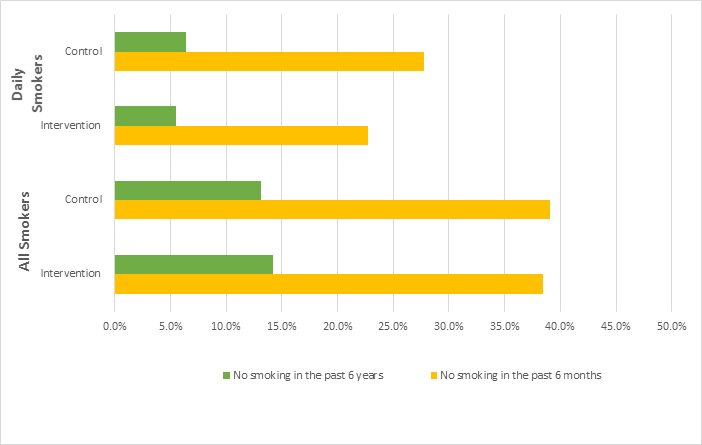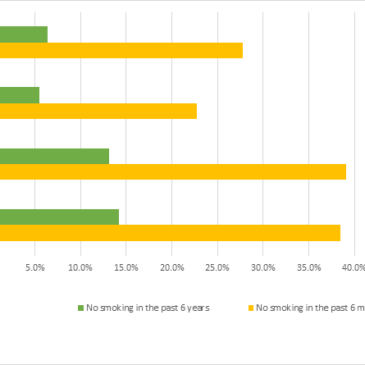The health problems associated with smoking tobacco are well known and continue to threaten public health. High school age smokers are especially at risk for continuing to smoke into adulthood and having health complications later in life. What happens when young smokers complete interventions? Recently, researchers led by Arthur Peterson Jr. studied the long term effectiveness of high school smoking interventions[1]. This week, ASHES reviews their study.
What was the research question?
Do the positive effects from teen smoking interventions continue into young adulthood?
What did the researchers do?
The researchers studied 2,151 smokers recruited from 50 different high schools. They randomly assigned the students to one of two groups. The intervention group met over the phone with a trained counselor who used Motivational Interviewing and Cognitive Behavioral Skills Training to aid students in their attempts to quit. The control group did not receive any smoking intervention led by a counselor. The participants answered questions about their smoking at the beginning of the study, one year later, and then again after 7 years.
What did they find?
In a previous paper[2], Peterson and colleagues reported that for daily smokers, the intervention promoted smoking cessation in the short term. However, in this paper, they found no evidence that the intervention had any long-term effect. At the 7-year follow-up, the intervention and control groups did not differ; less than 40% of participants in both groups had quit smoking in the past 6 months, and less than 15% had refrained from smoking across the study period (see Figure).

Figure. Percent of all teen smokers and daily teen smokers who had stopped smoking at the 7-year follow up. Click image to enlarge.
Why do these findings matter?
Smoking poses as a serious health risk, especially among youth. It is important to identify treatment or intervention methods that are effective not only in reducing smoking in high school, but also in preventing teens from continuing to smoke into adulthood.
Every study has limitations. What about his one?
A limitation of this study is that the counseling sessions were conducted over the phone. Counseling sessions done in person might have been more effective. The researchers also did not measure the possible reasons for why students relapsed over the course of 7 years. This information would have been valuable in identifying why young smokers relapse, and in building intervention methods that are designed to tackle more specific problems related to tobacco use.
For more information:
To learn more about how smoking affects you, or information on ways to quit, click here. If smoking cigarettes is affecting your life and you are thinking about change, take the first steps here. For additional tools, please visit the BASIS Addiction Resources page.
— Alec Conte
What do you think? Please use the comment link below to provide feedback on this article.
________________
[1] Peterson, A. V., Marek, P. M., Kealey, K. A., Bricker, J. B., Ludman, E. J., & Heffner, J. L. (2016). Does Effectiveness of Adolescent Smoking-Cessation Intervention Endure Into Young Adulthood? 7-Year Follow-Up Results from a Group-Randomized Trial. PLOS ONE, 11(2), 1-20.
[2] Peterson, A. V., Marek, P. M., Kealey, K. A., Bricker, J. B., Ludman, E. J., Mann, S. L., & Liu, J. (2009). Group-Randomized Trial of a Proactive, Personalized Telephone Counseling Intervention for Adolescent Smoking Cessation. Journal of the National Cancer Institute, 101(20), 1378-1392.




